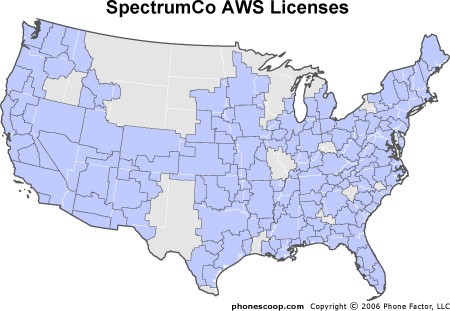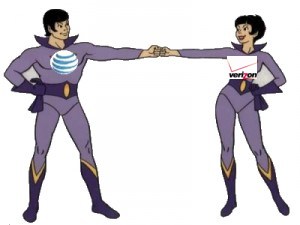
You gotta love Verizon’s $30 upgrade fee to provide customers with the level of service and support they have come to expect. I’d rather deal with “no credit, no refunds, no checks” CricKet.
Verizon Wireless customers pay a $30 “upgrade fee” when purchasing new equipment with a new two-year contract, ostensibly to “provide customers with the level of service and support they have come to expect.”
After losing more than an hour of my life yesterday afternoon inside a Verizon Wireless store, I am here to tell you it isn’t worth it.
For the second time in seven months, Verizon Wireless has taught me they specialize in keeping customers waiting, giving them conflicting information, and proving the employees should be availing themselves of the “Wireless Workshops, online educational tools, and consultations with experts who provide advice and guidance on devices that are more sophisticated than ever.”
The latest nightmare began with an upgrade to Samsung’s Galaxy S3 that arrived with two 4G SIM cards that were initially declared useless-on-arrival. Despite early assurances that a customer service representative should be able to manage the activation of the phones without loss of our coveted unlimited data plan, it turned out a visit to a local Verizon Wireless store was recommended to swap out the 4G SIM cards enclosed in the box as part of a slightly-complicated activation.
Walking into the Pittsford, N.Y. Verizon store brought a feeling of trepidation when I realized my friend “the Verizon Wireless Welcome Kiosk” that I had been signing in at during previous visits was now missing. Instead, the store manager, armed with an Apple iPad, registered me for the inevitable queue of customers waiting for assistance.
“The wait should be around 15 minutes,” the store manager promised.
Nearly 30 minutes later, as I watched what seemed to be the only employee not on break deal with Ms. I-Don’t-Know-and-I-Can’t-Decide, the store manager returned to ask why I bothered to show up in-store to activate phones I could have managed online or by phone.
“Because I was told to,” I explained. “I have two phones that require new SIM cards and special attention to ensure I don’t lose my unlimited data plan.”
“Well, you have to activate them first,” came the reply.
That was news to me, of course, when a Verizon Wireless phone representative an hour earlier warned me specifically not to activate the phones and let a store customer service representative handle everything.
“Please don’t even attempt to activate the phones because I have had customers doing that all day who forfeited their unlimited data plans when they tried,” urged the phone representative. “You need to bring everything to the store and make sure they do it for you because I don’t want you inconvenienced.”
Good intentions, but reality always intrudes.
By now, 35 minutes into my 15-minute wait, several additional frustrated customers trickled in, all with the same phone. One found he couldn’t activate it even when he tried. Another needed his assigned a different number. Again, the store manager insisted the customers activate their phones before approaching a store employee.
As I wearily watched Ms. Indecision -still- taking up the time of the employee that was going to serve me next, I heard other customers casually griping about upgrade fees, the new Share Everything plan, and Verizon’s idea of customer service these days. The consensus: Verizon was shaking down their customers for more cash and also punishing people forced to walk into a store to resolve a problem. Pittsford is one of Rochester’s wealthiest suburbs, and even here customers were tapped out.
I have literally been here before. Back in December, at the same store, a remarkably unhelpful Verizon Wireless employee insisted the problems with my last phone, intermittent they might be, were not his problem if he could not exactly duplicate it while I waited. Since he did not have time to try (but had at least 15 minutes to chat up a young lady that preceded me about his holiday pie-making experiences), I was on my own, just as my warranty was set to expire.
He no longer works there.
As each new customer arrived on this remarkably warmer July day, the store manager warned the wait was growing longer and longer. He didn’t mention the customer -still- at the counter contemplating this or that and holding up the entire free market wireless economy in the process.
 At this point, I was advised I could activate my phones by dialing *228 and I’d be all set. Only a year earlier, a Verizon employee told me 4G LTE customers should burn their fingers with a cigarette lighter if they ever felt the urge to try, because it would “scramble the SIM card forever.” True or false, I felt burned already.
At this point, I was advised I could activate my phones by dialing *228 and I’d be all set. Only a year earlier, a Verizon employee told me 4G LTE customers should burn their fingers with a cigarette lighter if they ever felt the urge to try, because it would “scramble the SIM card forever.” True or false, I felt burned already.
I decided instead to call Verizon Wireless customer service, ironically, from inside the Verizon Wireless store that was supposed to be giving me “the level of service and support I have come to expect.”
“Due to (incredibly) high call volumes, your wait (is likely to be until the snow flies before someone will pick up your call).”
I then realize there are two other customers doing precisely the same thing I am, which probably explained those high call volumes.
Mr. Store Manager returned to ask if I had activated my phones yet. I explained I could not get through, but was bemused to notice the phones had now powered up with messages indicating they were in the process of activating themselves.
“That’s because you had your phones turned on,” came the odd explanation. “You have to turn the phones off before you call customer service.”
“I don’t think so, I seem to recall my Samsung Droid Charge activated itself in a similar fashion,” I replied.
“No, that isn’t how it works.”
Two minutes later, the phones activated themselves. I’m not certain I’ll ever know exactly why, especially after being told I had dud 4G SIM cards. But I also found it ironic that even a confused customer like myself, now dying in my personal Verizon hell, seemed to know more than the people working there, and I didn’t even take that Wireless Workshop.
Regardless, I was elated that stage of my trial had come to an end. Now I only had to have an employee swap those SIM cards out to assign the phones to the proper phone numbers. Then I could escape my excellent customer experience for good.
But there was Ms. Should-I-or-Shouldn’t-I, still tying up the growing line (the wait had now grown to perhaps an hour for customers entering the store… at their own risk.)
Suddenly, an employee miraculously returned from break and I was finally helped.
“You want insurance on these phone, right?”
“No.”
“But you have 14 days to change your mind.”
“No.”
“Which phone do you want on which number.”
“Since the phones are precisely the same, it does not matter to me.”
Long pause.
The employee kept dropping below the counter to deal with an interminable number of snake-long thermal cash-register-like receipts that kept spitting out of the printer whenever he did anything on the slowly-responding computer.
After another 15 minutes, the new 4G SIM cards were in.
“Now let me show you some of the cool new features on your phone, but first enter your name and password.”
I compromised by entering my name and password but suggested we skip the training course. Besides, my personal lease renting space inside the store (and my new 2-year contract) was likely to expire before I would finally get out of there.
“We have some nice new cases to show you to protect your phones.”
“No thanks.” Now I am questioning why I bought the phones in the first place.
“Okay, now it is time to restore your apps.”
Kill me now.
As soon as the phones were up and running, back into the boxes they went, and polite thank-yous were delivered to all concerned. I then busted out of the store, more than an hour after my promised 15-minute wait, like a prisoner escaping Attica. Sure I realize I am not “free at last,” stuck on a new contract with Verizon for another two years, but I can do my time standing on my head so long as I can avoid ever dealing with another Verizon Wireless store… and keep my unlimited data.
They should pay me $30 to go through upgrading anything with them. Oh wait, just a year or so ago they did — $100 as part of Verizon’s long-gone “New Every Two” program… exorcised right along with their budget-minded voice calling options, unlimited data, and text plans suitable for the occasional text here and there. In their place, the all-new, super exciting $90 Share Everything plan… including $50 for a “generous” 1GB data allowance.
Thanks Verizon Wireless!


 Subscribe
Subscribe










